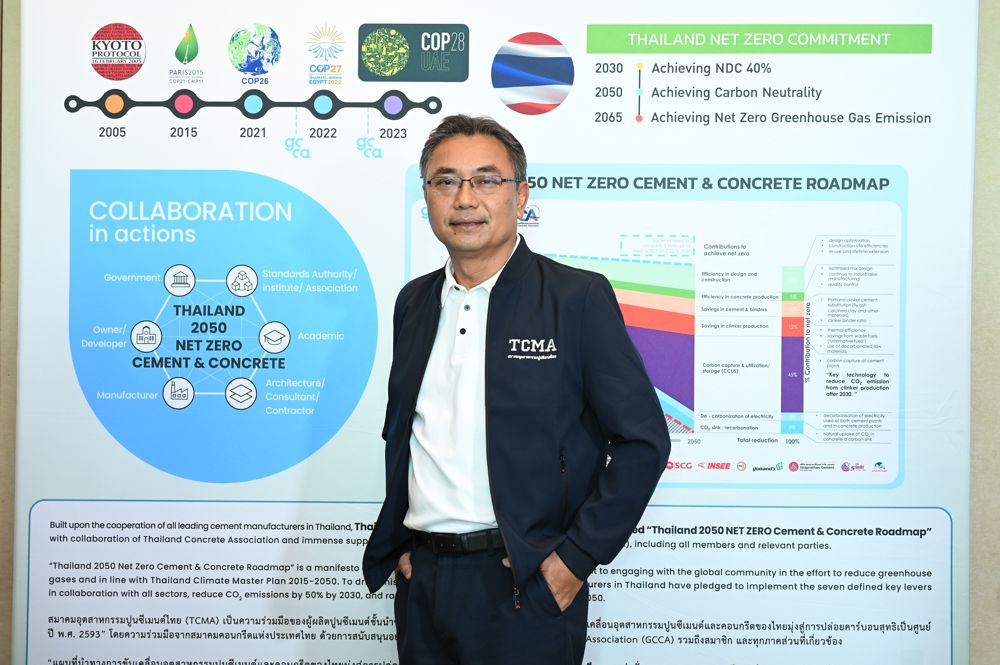Accelerating Thailand’s Cement Roadmap to achieve Net Zero
Dr. Chana Poomee will continued his excellent leadership of The Thai Cement Manufactures Association for another term.
Dr. Poomee presented his vision statement ‘TCMA Synergizing the Actions toward Net Zero 2050’, which focused on several key mission objectives to accelerate the Thai cement industry, transitioning to clean energy, achieving Net Zero by 2050, integrating cooperation with all sectors, elevating TCMA’s role on the international forum to connect green funds in helping Thai industry to cope with the green economy megatrend and sustainable growth.

Dr. Chana Poomee, along with the TCMA Board, outlined the long-term direction of TCMA, which is a collaboration nexus of leading Thai cement producers.
TCMA, over the next two years, 2024-2026 will accelerate its efforts to join forces with all sectors to achieve the key missions in four areas:
1. Research and development of new low-carbon cement such as calcined clay cement
This mission will resume immediately after a successful transition to hydraulic cement as a primary cement in Thailand since January 1, 2024, marking Thailand’s New Era of Low Carbon Cement.
2. Accelerating the expansion of maximize resource-efficiency mining practices according to the Minerals Act B.E. 2560 (2017)
The intent of this mission is for the mining industry contributing to the sustainable economic development of the country, for example; joint development mining area ‘Khao Wong Model’ in accordance with the green mining practices, reducing environmental and health impacts from mining through innovation and technology, rehabilitate old mining areas into community water sources and learning centers, and contributing to a low-carbon society.
3. Building an integrated ecosystem and turning waste to value through the cement production process according to the Bio-Circular-Green Economy (BCG)
Currently, the cement industry uses waste from the industrial, community, and agricultural sectors (after 3R process-reduce-reuse-recycle) as fuel in co-processing kilns. This initiative maximizes resource efficiency, reduces PM2.5, contributes to the zero-landfill, and most importantly, lowers greenhouse gas emissions. TCMA, with this action aims to reduce greenhouse gas emissions not less than 6.9 million tons of carbon dioxide in 2030.
4. Leveraging innovation for industry’s transition to clean energy
This mission requires a synergy of government policies, appropriate technology, and global green funds to support Thailand in transitioning to clean energy and boosting competitiveness. TCMA will work closely with partner agencies, such as Thailand Fellowship Cement Manufacturers, Federation of Thai Industries, Board of Trade of Thailand, Thai Bankers Association, and etc.
“PPP-Saraburi Sandbox: A Low Carbon City” will be accelerated
This project is the partnership among public, private and people by using 3C approach: Communication-Collaborative action- Conclusion(step-by-step). Saraburi Province is selected as pilot area for several prototype GHG reduction approaches and projects, which respect different cooperation framework of each sector and align with Thailand NDC Roadmap. To achieve a concrete result, the pilot project has been implement:
- Energy Transition, such as a solar energy project, Napier grass cultivation as energy crop, the grid modernization project, and the CCUS research project;
- Industrial Processes and Product Use (IPPU) such as produce hydraulic cement and develop new types of low-carbon cement;
- Waste management such as turning waste into Alternative Fuels (AF) and Refuse Derived Fuel (RDF);
- Agriculture such as promoting alternate wetting and drying at rice paddle field and
- Land Use, Land-Use Change and Forestry (LULUCF)
“The implementation of this project will result in a win-win-win situation for all parties. This success however, would not have been possible without the concerted effort and support of all sectors, in particular regarding regulations that must be revised to enable the project to proceed. As these prototype projects are rolling out, we are also learning and understanding pathways to work forward. Some success project can be extended to other provinces and some failure will find solutions, such as proposing to relevant agencies, in local and central governments, to amend regulation roadblocks,” said Dr. Chana Poomee.
Dr. Chana, concluded that: “With the strong determination and clear policy, TCMA will synergize its actions in implementing the abovementioned policies to support the government and other relevant sectors, including those at the regional level, such as the ASEAN cement collaboration towards decarbonization, and at the global level, such as continued attending COP27 and COP28, and working closely with Global Cement and Concrete Association (GCCA), in collaboration with the UNFCCC and the World Economic Forum. TCMA will build networks to foster synergy, connect funding to Thailand, sharpen the competitiveness of the industry, and support transition Thailand to a low-carbon society as intended.”
Thai cement industry outlook in 2024, estimated will rebound compared to the year before. Thanks to enabling factors from the recovering tourism and related services sectors, growing exports which will in turn stimulate private construction sector, together with the ongoing government’s mega projects and a positive outlook after the Annual Budget Act came into effect. However, with the rising cost of living and high levels of household debt, the purchasing power of residential consumers is hard hit.
In addition, inflation, interest rates, and the overall economic slowdown are also negatively affecting private sector investment (commercial) as well as the health of the Thai economy.





























